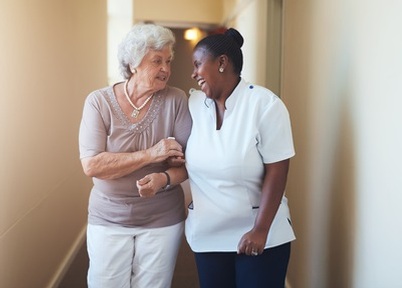Helo, shwmae? Care workers learn Welsh to ask elderly 'How are you?'
Care workers across Wales are going back to school to learn Welsh and communicate with elderly people in their ‘mother tongue’ - to make them feel at home.

Whether you’re moving to a care home or receiving home care, meeting new care workers and being away family and friends can be daunting for anyone, so a little reminder of home with a bit of Welsh can be a great comfort. Just asking someone ‘Sut ydych chi’n teimlo heddiw’ (‘How are you feeling today?’) can make the difference between silence and the start of a conversation.
Welsh lessons for care workers kicked off in October with a free online course for the health and care sector. Training for at least 100 health and social care workers is being offered until March 2019 – as part of a greater goal by the Welsh Government to reach a target of one million Welsh speakers by 2050.
’Hiraeth’ is ‘dreadfully important’
“A little bit of colloquial Welsh means people are more likely to sit and talk”, says Liz King-Jones, Work Welsh engagement and development officer, speaking in Welsh at the recent National Social Care Conference in Cardiff.
“People in the care sector aren’t receiving care in their mother tongue. We feel institutions will benefit from taking part in this.”
A care worker, speaking in footage published by Social Care Wales TV, explains it best. “Hiraeth [Welsh for 'nostalgia'] for the Welsh person is so dreadfully important, and - how can I say? – the importance of talking to somebody about, perhaps, where they lived. If they have photos in their room, get to talk to them about it.
“There’s an instant rapport and thing are much, much easier. It’s like a big Welsh family and that’s can’t be underestimated.
“Offering choices is extremely important to somebody and getting to find out the way that somebody, how can I say, took their tea. Did they take sugar, ‘Llaeth neu siwgr yn eich te?” which means do you take sugar?”

As well as elderly people, disabled, those with learning disabilities and mental health issues, it is also known that people with dementia can benefit from having a conversation in the language they first learned as children, as recent memories fade and childhood memories come to the fore.
Some 62 per cent of those who cannot speak Welsh would like to learn it and 85 per cent with some Welsh ability want to speak it better, according to the National Survey for Wales 2017-18, (published October).
Can you manage a ‘Lechyd Da’ with a drink?
“The Welsh language belongs to all of us, whether we’re fluent speakers, can just get by, are starting to learn or can manage a ‘Iechyd Da’ with a drink”, said Minister for Welsh Language and Lifelong Learning Eluned Morgan, alluding to the simple delight of saying ‘Cheers!’ in Welsh.

“It’s great news that so many people would like to learn or improve their Welsh and it’s even better news that the help you need is out there. There are so many different ways to learn and I would encourage anyone in that 62 per cent or 85 per cent to find the right course for them and to give Welsh a go."
37% of care workers in Wales speak Welsh
There were 5,965 registered care workers in Wales in 2017 - of which 37 per cent said that they could either speak some Welsh or were fluent. Almost a fifth (19 per cent) of the total Welsh population can speak Welsh – that’s 562,016 people over the age of three, according to the 2011 census.
The National Centre for Learning Welsh is working with Social Care Wales to offer ‘Work Welsh’ courses to care workers across Wales. The courses are scheduled to run until the end of March 2019. The Welsh government has also made available an online diagnostic tool to assess individual care workers’ level of Welsh, prior to them taking a language course.
A spokeswoman for the Welsh Government told carehome.co.uk it had "no current plans" to introduce a mandatory roll out of Welsh training for care workers across Wales, but it would be "something which could be considered in future".
Eluned Morgan added: “When it comes to learning or improving, there is something for everybody, whether that’s an online course, a taster session, a Clwb Cwtsh course where you can learn alongside your children or grandchildren, work-based courses or courses that lead to formal qualifications.”
Top things care workers can say to Welsh speakers
For those waiting to sign up for a Welsh language course, try practising these care-friendly phrases.
Helo, shwmae? Hi, how are you?
Mrs Jones ‘dw i I’m Mrs Jones
Sut ydych chi’n teimlo heddiw? How are you feeling today?
Hoffech chi godi nawr? Would you like to get up now?
Ydy popeth yn iawn? Is everything all right?
Ydych chi wedi bwyta? Have you eaten?
Hoffech chi wylio’r teledu? Would you like to watch the television?
Main amser swper. It’s time for supper.
Alla i nôl rhywbeth i chi? Can I fetch you something?
Latest Features News
 25-Nov-19
2019 Election: Boris Johnson leaves social care in 'too difficult box' but Labour vows to end 'crisis'
25-Nov-19
2019 Election: Boris Johnson leaves social care in 'too difficult box' but Labour vows to end 'crisis'
 18-Oct-19
Podcast: Wendy Mitchell and dementia: 'My biggest fear is not knowing who my daughters are'
18-Oct-19
Podcast: Wendy Mitchell and dementia: 'My biggest fear is not knowing who my daughters are'
 27-Sep-19
Exclusive: Care minister backs care workers' call for time off to grieve and attend funerals
27-Sep-19
Exclusive: Care minister backs care workers' call for time off to grieve and attend funerals
 19-Sep-19
Podcast: Gyles Brandreth says poetry helps ward off dementia
19-Sep-19
Podcast: Gyles Brandreth says poetry helps ward off dementia
 30-Aug-19
Edinburgh Fringe funnyman joins comics facing toughest audience at care home gig
30-Aug-19
Edinburgh Fringe funnyman joins comics facing toughest audience at care home gig